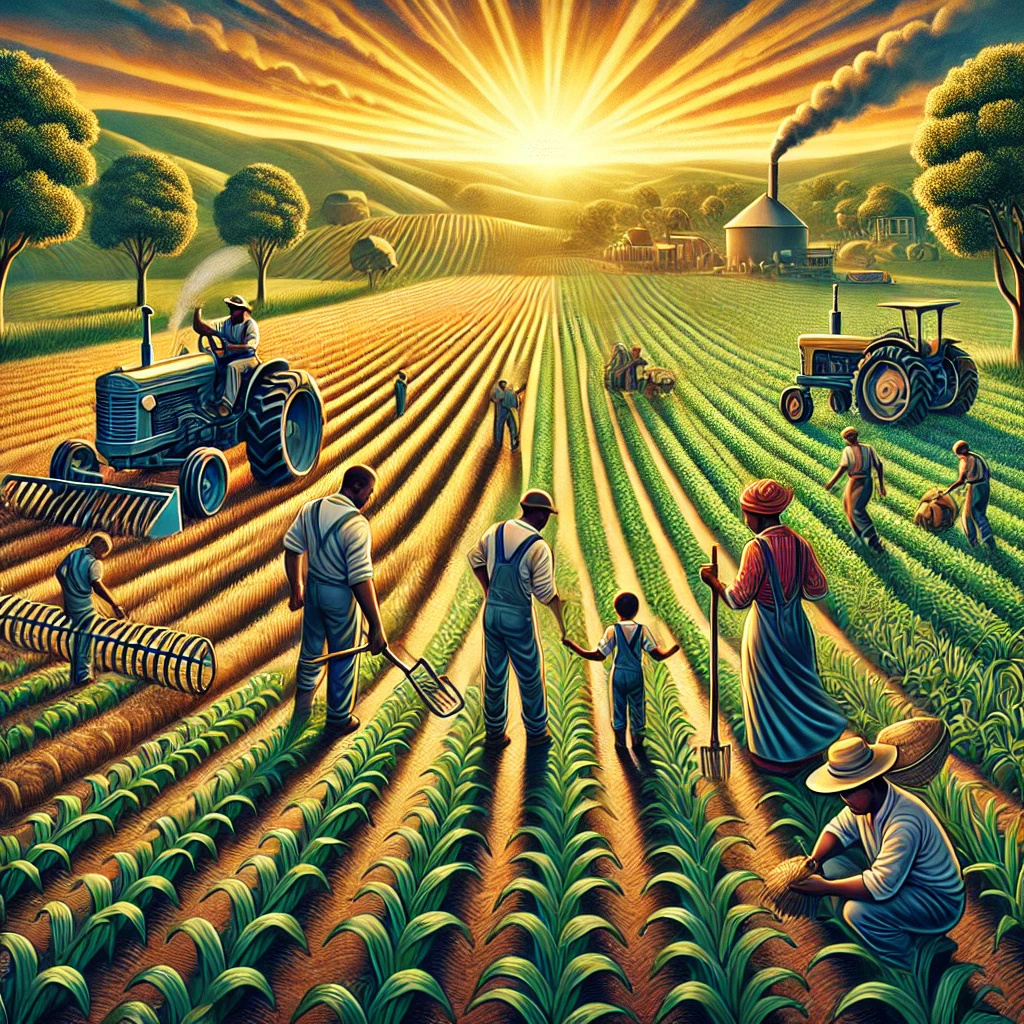Reclaiming Their Role
Today, Black farmers represent less than 2% of U.S. farmers. However, initiatives focused on equity and inclusion are helping to reverse this trend, recognizing the invaluable role these farmers play in creating sustainable and equitable food systems.
1. Promoting Sustainability Through Local Sourcing 
Black farmers are key players in fostering sustainability by providing fresh, locally grown produce to communities and restaurants.
Why It Matters
Reduces the carbon footprint associated with long-distance food transportation.
Encourages partnerships between local farms and restaurants, enhancing customer engagement.
Supports inclusive dining by offering culturally relevant and fresh ingredients.
Real-World Example
Soul Fire Farm in New York is a Black-led organization practicing regenerative farming techniques while supplying fresh produce to underserved communities. Restaurants partnering with farms like these can highlight their commitment to sustainability and social equity.
2. Driving Innovation in Agriculture 
Black farmers often lead with innovative, sustainable techniques such as regenerative farming, permaculture, and agroecology.
Why It Matters
Improves soil health and biodiversity, which are critical for long-term sustainability.
Supports diverse crop production, enabling restaurant diversity through varied menu options.
Advances knowledge-sharing within the farming and culinary industries.
Actionable Tip
Restaurants can collaborate with Black farmers to create seasonal dishes that highlight unique, sustainably grown ingredients, enhancing both flavor and impact.
3. Building Inclusive Supply Chains 
Inclusive supply chains that prioritize Black farmers help address systemic inequities while driving QSR strategies that resonate with socially conscious consumers.
Why It Matters
Encourages equitable economic opportunities for underrepresented farmers.
Promotes transparency and fairness in sourcing, strengthening brand loyalty.
Aligns with consumers’ growing preference for businesses that reflect their values.
Real-World Example
McDonald’s has implemented initiatives to source more ingredients from minority-owned suppliers, including Black farmers, as part of its broader commitment to diversity and inclusion.
Actionable Tip
Audit your restaurant’s supply chain to identify opportunities for partnering with Black farmers and minority-owned businesses. Highlight these partnerships in your marketing materials to drive customer engagement.
4. Elevating Culturally Relevant Dining Experiences 

Black farmers contribute to culturally significant ingredients, such as okra, collard greens, and sweet potatoes, which are staples in Southern and Afro-Caribbean cuisine.
Why It Matters
Enhances inclusive dining by reflecting the heritage and traditions of diverse communities.
Encourages innovation by introducing customers to lesser-known ingredients and flavors.
Strengthens community ties through food storytelling.
Actionable Tip
Collaborate with Black farmers to create special menus or events centered on culturally inspired dishes. These efforts can attract diverse customers while supporting local agriculture.
5. Educating Communities on Sustainability 

Many Black farmers are also educators, teaching communities about the importance of sustainable agriculture and food sovereignty.
Why It Matters
Empowers communities to grow their own food and reduce dependence on industrial farming.
Builds awareness around the interconnectedness of farming, dining, and environmental health.
Encourages restaurants to adopt sustainable practices by showcasing success stories.
Real-World Example
Detroit’s D-Town Farm, operated by the Detroit Black Community Food Security Network, provides educational programs on urban farming while supplying fresh produce to local markets and restaurants.
6. Addressing Food Insecurity Through Farming 

Food insecurity disproportionately affects Black and underserved communities. Black farmers play a pivotal role in alleviating this issue by providing fresh, affordable produce to food deserts.
Why It Matters
Ensures equitable access to nutritious food for marginalized communities.
Strengthens the connection between farms, restaurants, and local consumers.
Aligns with QSR strategies aimed at social responsibility and inclusivity.
Actionable Tip
Partner with Black farmers to donate surplus produce or host “pay-what-you-can” community meals. These initiatives not only support the community but also reinforce your restaurant’s commitment to equity.
7. Inspiring the Next Generation of Farmers and Entrepreneurs 

Black farmers are paving the way for future generations by mentoring young farmers and creating pathways for success in agriculture.
Why It Matters
Encourages diversity within the agricultural and culinary industries.
Drives innovation through fresh perspectives and ideas.
Creates long-term sustainability by empowering young leaders.
Real-World Example
The National Black Farmers Association offers scholarships and training programs for aspiring farmers, ensuring that the next generation is equipped to lead.
Actionable Tip
Support programs that mentor young farmers, and use your platform to highlight their stories and contributions.
Elevating Black Farmers for a Sustainable Future
Black farmers are indispensable to building a more equitable and sustainable food system. By promoting restaurant diversity, fostering inclusive dining, and addressing systemic barriers, these farmers enrich the culinary world while driving positive change. For restaurants, partnering with Black farmers isn’t just an ethical choice—it’s a strategic one that resonates with today’s socially conscious diners.

